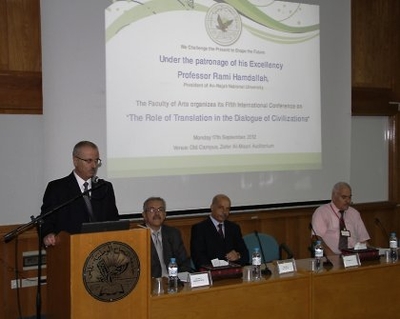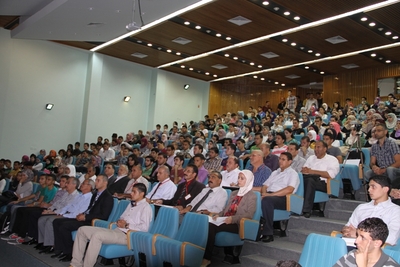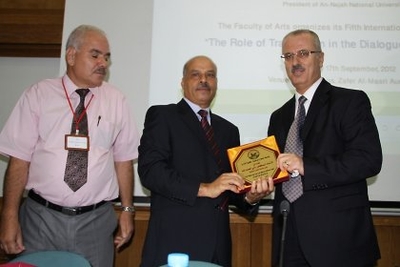The Fifth International Conference on the Role of Translation in Cultural Dialogues; held at An-Najah National University encouraged the increased development of dialogue between different peoples.
The Fifth International Conference on the Role of Translation in Cultural Dialogues was held in the college of literature in An Najah National University, under the direction of President Dr. Rami Hamdallah. The participants encouraged the president of the university to establish centers specializing in translation at Palestinian universities, and invited him to develop and deepen dialogue between peoples, and to hold further conferences in the forthcoming years.
 Amongst those who attended the conference were; Dr. Rami Hamdallah (President), Dr. Maher Al-Natsheh (Deputy President of Academic Affairs), Dr. Khalil ‘Awdah (Head of the College of Literature), Dr. Fayez Aqel (Head of the Conference Preparatory Council). Also in attendance were members of the preparatory council, researchers, students and other invitees.
Amongst those who attended the conference were; Dr. Rami Hamdallah (President), Dr. Maher Al-Natsheh (Deputy President of Academic Affairs), Dr. Khalil ‘Awdah (Head of the College of Literature), Dr. Fayez Aqel (Head of the Conference Preparatory Council). Also in attendance were members of the preparatory council, researchers, students and other invitees.
Dr. Rami Hamdallah gave a welcoming speech to the attendees, participants, experts, translators and academic contributors to the works of the Fifth Conference on the Role of Translation in Cultural Dialogue. The President stressed the importance of holding a conference on the subject of translation in cultural dialogue, as cultural thought provides opportunities for young people to come together with the aim of transcending boundaries of race or nationality through communicating and benefiting from each other’s experiences. Dr. Hamdallah also pointed out the importance of translation as a cultural and philosophical transmitter. Translation can be counted as an established art in itself, relying on ingenuity and linguistic mastery in linking cultures. Due to this, Arab and Muslim persons, particularly in the era of the Abbasid and Umayyad dynasties, considered translation of utmost importance. It was instrumental in providing access to the knowledge acquired by preceding peoples and nations, and allowed them to understand science and cultural developments in accordance with the principles of Islamic doctrine. Translation further advanced during the Era of the Caliph Harun Rashid and his son, al-Ameen al-Ma’mun, a period in which writers and philosophers assisted Arab translators with accurate translations. Translation is both an art and a science.
Dr. Hamdallah also stressed that during the Modern Era there was an increase in the translation of philosophical research in the sciences, history and literature. Translation exists as the fundamental element of cultural encounters, which fosters communication between people and strengthens bonds of aid, thereby reducing negative sentiments and hatred. Given that human development relies on a universal effort to achieve common human goals to serve mankind in medicine, industry and environmental sciences and to reduce universal dangers for humans, and to ensure safety and security in the pursuit of additional ways to combat human failures, translation retains its crucial relevance. The development of peoples in developing countries, combined with the education of many generations to build relationships of assistance and mutual respect, are also a result of translation improving different aspects of life.
 Dr. Hamdallah stated that An Najah National University, as one of the largest Palestinian Universities aims to include departments specializing in translation and the teaching of many languages such as English, French, Spanish, and Russian, whether as a general requirement or as a part of certain courses. He also stated that the University hopes to invite and produce specialists to increase communication between generations in order to establish these cultural exchanges through the means of learning, exchange visits and different experiences. He also hopes that the suggestions of the conference will be achievable and will be fully realised.
Dr. Hamdallah stated that An Najah National University, as one of the largest Palestinian Universities aims to include departments specializing in translation and the teaching of many languages such as English, French, Spanish, and Russian, whether as a general requirement or as a part of certain courses. He also stated that the University hopes to invite and produce specialists to increase communication between generations in order to establish these cultural exchanges through the means of learning, exchange visits and different experiences. He also hopes that the suggestions of the conference will be achievable and will be fully realised.
Dr. Hamdallah concluded by thanking the audience for attending the conference in such large numbers.
Dr. Khalil ‘Awda gave a speech on behalf of the Literature Department, in which he discussed the importance of the role of translation in cultural dialogue. He expressed that as the world lives under the shadow of globalization, isolation through the refusal to communicate would result in a death sentence. He also added that cultural dialogue is a bridge between one group and another, and emphasized the importance of translation in peoples’ lives in order to understand different cultures.
Dr. ‘Awda also thanked Dr. Rami Hamdallah, for his continued support to the Literature Department and the conference. Dr.Fayez Aqel, then thanked the participants for their research for the conference, and expressed his hope that the formulation of these suggestions will aid the strengthening of cultural dialogue. He also thanked the president of the university for his support to the preparatory committee responsible for the conference.
The suggestions from the Fourth International Conference for Translation, the care of the university in forming cooperative ties between nations, and the realization of what could be achieved through translation in cultural dialogue, formed the cornerstone of the Fifth International Conference at the university.
 The conference included many themes, including the importance of translation in cultural dialogue in creating discord or harmony and cultural pluralism, with its advantages and disadvantages. The conference further discussed the position of the translator with the emergence of technological instruments and how one should work alongside technology. The translator’s role in post-colonialism, with the appearance of the refusal of local cultures, and this position in the context of Globalization were also subjects of debate.The participants further discussed the theory of translation, posing the question: Have Arab translators succeeded in applying a theory for the process of translation? Whilst also analysing the current situation of the study of translation in Arabic institutions, such as universities or language and translation. Finally, the conference ended on the topic of famous translators and their contributions to translations, such as Salma Aljuyusi and her project “Bruta”, Kalthum ‘Auda and her role in translation in Russian literature, Jibra Ibrahim Jubra and his role in translation of English and Arabic literature, Khairi Hamad and BIndali Ajjuzitheir's efforts in translation.
The conference included many themes, including the importance of translation in cultural dialogue in creating discord or harmony and cultural pluralism, with its advantages and disadvantages. The conference further discussed the position of the translator with the emergence of technological instruments and how one should work alongside technology. The translator’s role in post-colonialism, with the appearance of the refusal of local cultures, and this position in the context of Globalization were also subjects of debate.The participants further discussed the theory of translation, posing the question: Have Arab translators succeeded in applying a theory for the process of translation? Whilst also analysing the current situation of the study of translation in Arabic institutions, such as universities or language and translation. Finally, the conference ended on the topic of famous translators and their contributions to translations, such as Salma Aljuyusi and her project “Bruta”, Kalthum ‘Auda and her role in translation in Russian literature, Jibra Ibrahim Jubra and his role in translation of English and Arabic literature, Khairi Hamad and BIndali Ajjuzitheir's efforts in translation.



